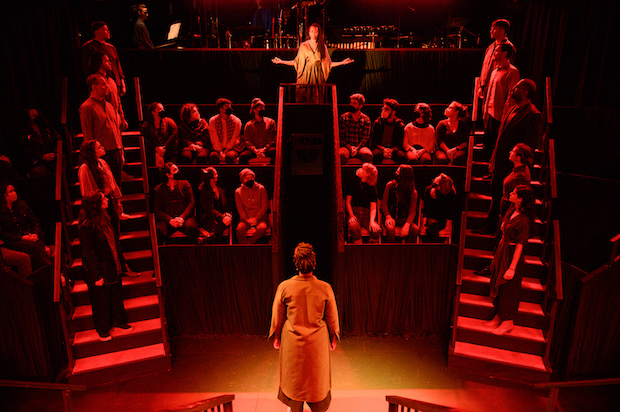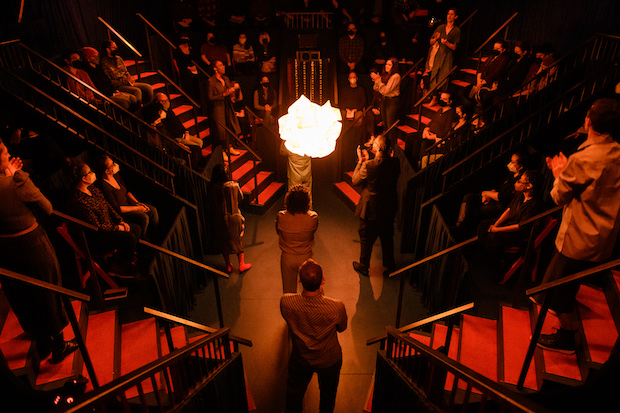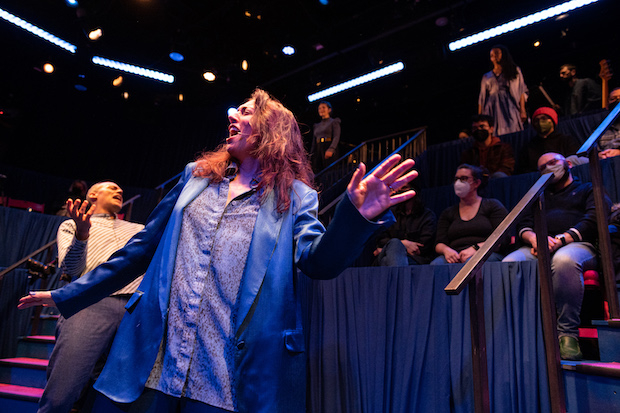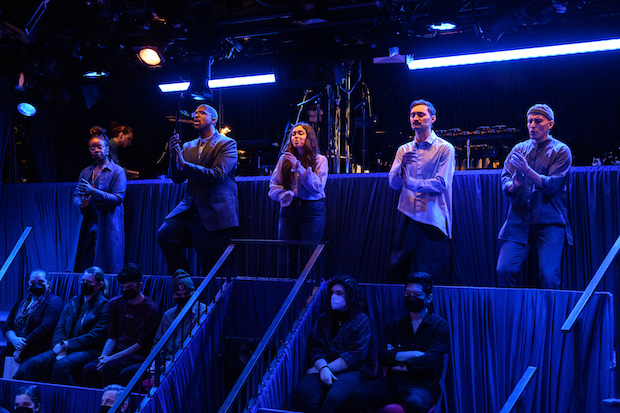Review: Heather Christian's Oratorio for Living Things and the Joys of the Unknown
Ars Nova presents the long-awaited world premiere of a new work of music.

(© Ben Arons)
In no small part due to the polemics of "new atheists" like Richard Dawkins and the late Christopher Hitchens, we have come to think of science and religion as diametrically opposed — but this separation is abnormal when viewed in the context of history. Atheism was not embraced by the likes of Galileo or Newton, nor was it a label Einstein applied to himself in the godless 20th century, describing his own religiosity in The World As I See It as an appreciation for the wonders of existence "which are only accessible to our reason in the most elementary forms."
It is with this same reverence for the vast unknown that composer Heather Christian has written her Oratorio for Living Things, now making its world premiere with Ars Nova at Greenwich House. This collision of classical music, experimental theater, and theoretical physics generates so much creative energy, it feels like it could power every theater in New York.
An oratorio is a musical work for orchestra and choir that tells a story and usually follows a religious theme (Handel's Messiah is the most famous example). This isn't the first time Christian has offered her own twist on a sacred form: A large section of her show Animal Wisdom was a requiem mass, hitting the requisite parts while completely shattering traditional notions of what a requiem sounds like. She sets out to do the same thing with Oratorio and succeeds spectacularly with a ravishing score presented in a highly unusual concert hall.

(© Ben Arons)
Greenwich House has been completely transformed for Oratorio for Living Things, with the audience squeezed into arena seating in anticipation of what seems like the teeniest, tiniest circus (scenic design by Kristen Robinson). It feels almost uncomfortably close in a post-Covid world, in which people have become highly aware of their proximity to other bodies. But our role in this musical drama becomes clearer with the illumination of a popcorn-like nucleus in the center of this cozy cell. Performers filter in from the voms and stairways around us, singing in Latin (there are 18 performers in the show, including the musicians situated in two areas overlooking the stage).
Latin gives way to English as they sing of photosynthesis, carbon, memory, and time. Christian blends these complex technical themes with personal memories, including a delightfully strange one about a 4-year-old believing a village of tiny people lives on his knees (imaginary friends also played a role in Animal Wisdom). There are no named roles, and everyone seems to be playing everything, like atoms endlessly recycled through time. While no performer stands out, all make personal connections with the material and each audience member.

(© Ben Arons)
Director Lee Sunday Evans cleverly arranges the cast on limited stage space, which Jeanette Oi-suk Yew lights in arresting ways: At one point, everyone falls into a deep shade of green and we watch as their natural color slowly returns. Márion Talán de la Rosa costumes the actors to appear as though they all just stepped off the same L Train. Music director Ben Moss achieves an almost seamless vocal cohesion in a chorus that is always on the move, performing in the round. Sound designer Nick Kourtides ensures that we can hear every note, if not every lyric. And to be fair, I'm not sure any amount of sound engineering could achieve the latter.
I typically place a high value on the intelligibility of the lyrics in musical theater. If you cannot convey what you're trying to say to the audience clearly, you're failing the form. This attitude would seem to bode poorly for Oratorio, a show in which overlapping lyrics pop up and submerge again, like salmon swimming upstream. Even the lines I thought I caught often managed to slip from my grasp: It took me embarrassingly long to realize that "two gays looking for a bathroom" (story of my life) was really "eighteen days looking for a bathroom" (still no clue where I heard the "two").

(© Ben Arons)
That's in a song called "Iteration 4: Building DNA via Ticket Tape of Time Spent," which features lyrics like "One year in the bag drop line" and "Eleven days trying to remember why you came into the room" — and I know that because each audience member is provided a copy of the libretto in a low-tech version of what the Metropolitan opera does with subtitles on the back of every seat in the house. I would recommend reading through it after the performance, because you'll want to devote your full attention to this strange and dynamic theatrical experience.
One could interpret the obscurity of the lyrics not as a flaw, but an authentic portrayal of existence: Not everything is knowable, and you probably won't understand the vast majority of what goes on in the world — but that doesn't mean you shouldn't lean forward and try. In its own sly way, Oratorio for Living Things is a plea for the audience not to throw up its hands and trust the science, but to keep exploring the mysteries of the universe.








